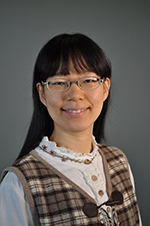You are here
Pei-Ling Wang
Dr. Pei-Ling Wang has joined PCIC's Climate Analysis and Monitoring Theme as a Post Doctoral Researcher. Her work is focused on developing uncertainty estimates to accompany high-resolution climate data, integrating remote sensing data into PCIC’s climate maps, creation of high-resolution time-series maps of BC’s climate, characterizing climate extremes in BC, and developing data sets to drive hydrologic models.
Before joining PCIC, Pei-Ling had diverse experiences in the study of multiple natural hazards and environmental issues, such as human-induced soil degradation and its impacts on climate and water balance, urban climate classification, earthquake models and monitoring, groundwater monitoring, landslide survey and simulation, and environmental impacts due to mining activities. She worked on research projects from the scale of sites to global scales that use multiple datasets from underground observations to satellite remote sensing. Pei-Ling is interested in integrating multiple fields to solve climate and environmental issues and improve the lives of human beings as well as all living creatures on Earth.
- Ph.D. Geography, University of Victoria, Victoria, Canada
- M.Sc. Earth and Ocean Science, University of Victoria, Victoria, Canada
- M.Sc. Geosciences, National Taiwan University, Taiwan
- Wang, P.-L. & J. Feddema (2020) Linking global land use/land cover to hydrologic soil groups from 850 to 2015, Global Biogeochemical Cycles, 34, e2019GB006356, doi: 10.1029/2019GB006356
- Wang, P.-L., S.E. Engelhart, K. Wang, A.D. Hawkes, B.P. Horton, A.R. Nelson, and R.C. Witter (2013), Heterogeneous rupture in the great Cascadia earthquake of 1700 inferred from coastal subsidence estimates. Journal of Geophysical Research: Solid Earth, 118(5), 2460–2473, doi:10.1002/jgrb.50101.
- Wang, C., Y. Chia, P.-L. Wang, and D. Dreger (2009), Role of S waves and Love waves in coseismic permeability enhancement, Geophys. Res. Lett., 36, L09404, doi:10.1029/2009GL037330.


